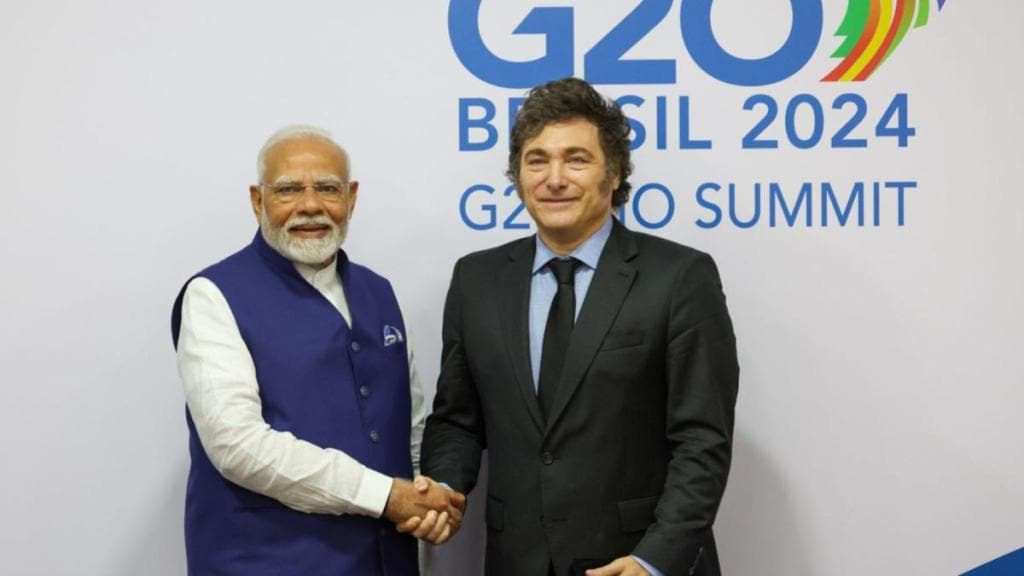With a strong focus on opening up the economy, Argentina is actively inviting Indian businesses to explore investment opportunities across various sectors, including energy, mining, technology, and agriculture.
At the forefront of Argentina’s push to attract foreign capital is the newly approved Large Investments Incentive Regime law, a key initiative designed to foster long-term economic growth by providing significant benefits to foreign investors. Speaking on this, Argentina’s Ambassador to India, Mariano A Caucino, stated in New Delhi that the law not only offers attractive incentives but also provides a guarantee of stability by freezing legal and tax conditions for a period of 40 years.

He highlighted the transformative nature of this initiative, stating, “President Javier Milei’s policies have turned from electoral slogans into concrete legal measures. Our Parliament, with the votes of both the ruling party and the opposition, has approved a ‘Large Investments Incentive Regime’ law, which grants very important benefits to foreign investors, in addition to freezing legal and tax conditions for 40 years. This measure makes it possible to verify the commitment that our country has adopted to favour foreign investment as a means for development.”
This new law is part of a broader economic reform agenda led by President Milei, who has adopted a pro-market approach aimed at stimulating growth and attracting foreign investments. The incentive regime, which focuses on deregulating key sectors of the economy, marks a sharp departure from Argentina’s past, characterized by overregulation, high taxes, and excessive government interference in business. This shift is intended to emulate the success stories of other nations, including India, whose economic reforms in the 1990s have been a source of inspiration for Argentina’s leaders.
Ambassador Caucino, speaking at the seminar on Argentina’s investment opportunities, explained how Argentina admires India’s economic liberalization. “We believe that the economic reforms and deregulation carried out by India are an example to follow,” he said, drawing parallels between the two countries’ efforts to liberalize their economies. India’s liberalization under former Prime Minister PV Narasimha Rao, and its continuation under Prime Minister Narendra Modi, has served as a model for Argentina, particularly in terms of opening up key sectors to foreign investment and fostering innovation.
In 2023, Argentina saw a significant increase in trade with India, reaching an impressive US$4.6 billion. The country has become a key supplier of vital commodities such as soybean and sunflower oil to India, crucial for maintaining food security. In fact, Argentina is currently India’s largest provider of soybean oil. Additionally, Argentine mining companies have established a growing presence in India’s lithium sector, an essential component in the development of electric vehicles.
Caucino noted that Indian companies have also made significant inroads into Argentina, particularly in mining. In northern Argentina’s Catamarca province, Indian firms have begun exploring lithium deposits, which are vital for the global electric vehicle industry. “2023 marked a milestone with Indian mining companies starting operations in Catamarca. They are not only exploring lithium but also showing interest in copper and gold,” said Caucino. India’s growing focus on sustainable energy and electric vehicles further aligns with Argentina’s rich mineral resources, especially lithium, which is vital for battery production.
The growing bilateral trade between India and Argentina is not limited to natural resources. Both countries have also seen collaboration in technology, with Argentine companies like Globant finding a foothold in India. Furthermore, Argentina’s rapidly expanding tech sector, with a particular focus on software development, fintech, and e-commerce, presents new opportunities for Indian investors.
One of the key sectors for investment in Argentina is energy. The country is home to one of the world’s largest reserves of unconventional oil and gas, located in the Vaca Muerta shale formation in Patagonia. The site holds 308 trillion cubic feet of gas and 16.22 billion barrels of oil. Major international energy firms, including Chevron, Shell, and ExxonMobil, have already made significant investments in this region, accelerating its production. He also mentioned that the CEO of YPF, Argentina’s national oil company, Horacio Marín, will be returning to India in early 2025 to explore further energy cooperation with Indian businesses.
Ana Colombo Blanco, in charge of the Economic and Commercial Division at the Argentine Embassy in New Delhi, pointed out that Argentina is a leading exporter of key commodities, from soybeans to wheat, as well as a major player in the global energy sector. She also underlined the country’s potential in mining, especially lithium, noting that Argentina is part of the Lithium Triangle, alongside Bolivia and Chile, holding some of the largest reserves in the world.
Moreover, Argentina’s well-educated, English-speaking workforce is a major asset for investors. With a literacy rate of 99% and a high number of university graduates, Argentina offers a pool of skilled professionals, particularly in sectors such as engineering, technology, and finance. According to Blanco, this human capital, combined with favourable government policies, makes Argentina an appealing partner for Indian businesses looking to expand into Latin America.
Argentina and India have already developed a strong relationship, and both countries share common values. The two nations upgraded their ties to a Strategic Partnership in 2019, and in November 2024, Prime Minister Narendra Modi and President Milei held their first bilateral meeting on the sidelines of the G20 Summit in Rio de Janeiro, Brazil. This meeting marked a significant step in further strengthening the bilateral ties between the two nations. During their discussion, both leaders exchanged insights on governance, economic reforms, and the expanding cooperation in several sectors, including pharmaceuticals, defence, critical minerals like lithium, oil & gas, and technology. They also expressed their satisfaction with the growth in trade relations and committed to further enhancing their Strategic Partnership for mutual benefit.
As Ambassador Caucino concluded, “We see India’s remarkable ascent as a global power, and we believe that Argentina has much to gain by deepening its ties with India, both economically and diplomatically.”

